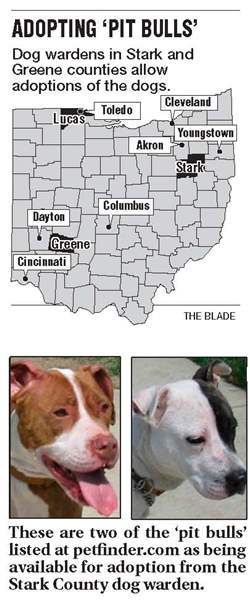
Decision day for adoption of 'pit bulls' nears
4/18/2010
Lucas County was for years a literal dead end for every unclaimed "pit bull" that entered the dog pound, well-behaved or bad.
Now, it's on a path to a different distinction: possibly one of the very few Ohio counties willing to adopt out "pit bulls."
This about-face on "pit bull" policy - if approved on Tuesday by county commissioners - would position Lucas County as somewhat of a rebel in the state when it comes to animal control. For many dog advocates, that would be a good thing.
"The majority of shelters across the U.S. adopt out 'pit bull'-type dogs. Ohio is the exception to the norm," said Ledy VanKavage, a lawyer for the Best Friends Animal Society who has visited Toledo to speak on what she considers the mistakes of breed-specific laws.

Lucas County has altered its stance on ‘pit bull' puppies,such as Liberty, by allowing their transfer to the humane society for adoption, but adult ‘pit bulls' cannot be adopted out — for now.
Though there's nothing illegal about owning or adopting "pit bulls," those types of muscular, boxy-headed dogs have been deemed inherently vicious by Ohio law since 1987. Ohio is the only state with the legislation.
Not surprisingly, dog wardens and local officials across the state haven't been keen on offering the so-called vicious animals to the public. That has left few options but euthanasia for "pit bulls" that arrive at the pound.
"Our county attorney has opined that Montgomery County will not adopt out any vicious dogs," said Mark Kumpf, director of the Montgomery County Animal Shelter in Dayton, one of the highest-acclaimed facilities in the region.
The abrupt shift regarding "pit bull" adoptions at the Lucas County Dog Warden Department - which still needs an authorization vote from county commissioners Tuesday - happened last week during new Dog Warden Julie Lyle's first days on the job.
Ms. Lyle said she disagrees with setting blanket restrictions on specific breeds and believes it wiser to judge each dog on an individual basis. Less than 48 hours on the job, she sought an end to the department's self-imposed policy of killing any and all "pit bulls" not reclaimed by an owner.
That policy was championed by former Dog Warden Tom Skeldon, who strongly believed "pit bulls" can be a public safety danger and argued that the dogs were genetically bred to attack and kill.
Of the 1,951 dogs lethally injected at the pound last year, 55 percent were what he deemed "pit bulls" or "pit-bull" mixes, according to county records.

Yet dog advocates counter that temperament is determined more by training than genetics and note how "pit bull" is considered a catchall descriptive term that can refer to multiple breeds, including the American Staffordshire terrier, Staffordshire bull terrier, and the American pit bull terrier.
Two Ohio counties that already adopt out "pit bulls" are Stark County, which includes Canton, and Greene County near Dayton.
Kevin Fox, interim dog warden for Stark County, said his shelter has offered "pit bulls" for about a year at the urging of a volunteer dog warden oversight committee. Before that change in policy, the pound euthanized every "pit bull" without an owner just as Lucas County has done. "We try to give them an opportunity," Mr. Fox said. "I know a lot of people who have really nice 'pit bulls.'•"
So far, the adoptions have been a success for the county, with no reported incidents of later bites or attacks, Mr. Fox said. Still, the new policy didn't bring an end to "pit bull" euthanasia, as the number entering the pound far outpaces adoption demand.
Of the 77 total dogs put down during the months of February and March, about 90 percent were pit bulls, according to the warden.
And they don't give just any "pit bull" to anyone. The dogs must be spayed or neutered and pass a temperament test to be eligible for adoption.
Those wishing to adopt must have an adequate fence or pen at home to restrain the animal and need to satisfy state law by insuring the dogs for $100,000 or more. "Pit bull" insurance costs about $500 to $700 a year, Mr. Fox said.
"Pit bulls" have been up for adoption in Greene County for the past five years since the arrival of Dog Warden Harold Brown, a veterinarian.
Dr. Brown said he started the adoptions after receiving a legal opinion from his county prosecutor saying that because owning "pit bulls" is legal, it should be acceptable to adopt them out.
Since then, the shelter has matched about 10 "pit bulls" with new owners and 10 others with rescue groups. The experience has been largely positive, although a few owners did return their dogs because the animals displayed aggressive tendencies as they grew older, Dr. Brown said.
If Lucas County commissioners vote to approve the necessary resolution on Tuesday, Ms. Lyle plans to start testing the "pit bulls" in the county's kennels for temperament to offer the well-behaved ones for adoption.
The county prosecutor's office is drafting a document for those who adopt to sign that would release the county from liability if vicious behavior occurs, Assistant Prosecutor Karlene Henderson said.
Ms. VanKavage of Best Friends Animal Society described how Ms. Lyle's intention of adopting out some "pit bulls" that pass temperament tests is what the majority of animal shelters are doing.
"They don't go by appearance, they go by temperament," she said. "The trend is to get rid of breed discrimination."
Steve Serchuk, chairman of Lucas County's Dog Warden Advisory Committee, said he envisions several members of the committee supporting Ms. Lyle's effort to start "pit bull" adoptions. Still, he understands how an organization would be hesitant to do such adoptions because of how the law currently reads.
"I think it's easy to say, 'We're just following the state law and the state law says it's a vicious dog by definition and we don't want to adopt out vicious dogs,'" Mr. Serchuk said. "But is it the right thing to do?"
The state law is being challenged by a bill sponsored by Rep. Barbara Sears (R., Monclova Township) that would strike the language declaring "pit bulls" as automatically vicious.
At a hearing last week in Columbus of the Ohio House Agriculture and Natural Resources Committee, bill proponents argued that vicious behavior results from nurture rather than nature and that "pit bulls" can make good family pets.
Opponents testified that there is something inherently hotheaded about "pit bulls" and warned that they become especially dangerous if raised in the wrong environment.
Mr. Skeldon, the former county dog warden, spoke as a member of the Ohio County Dog Wardens Association and urged lawmakers to keep what's in place.
"The job of dog warden is to protect the public from dogs," Mr. Skeldon told the committee. "The No. 1 biter in Lucas County has been the 'pit bull' the last three years running."
The latest incident occurred Thursday when a 16-year-old Toledo girl suffered multiple bites to her right thigh and both hands after being attacked by a wandering "pit bull" while waiting for a school bus with other students. The dog, its owner unknown, was quarantined at the pound.
Jean Keating, co-founder of the Ohio Coalition of Dog Advocates, said she supports Ms. Lyle's decision to begin adopting out "pit bulls" that pass temperament tests and called it a good step toward finding good homes for dogs that would have died on Mr. Skeldon's watch.
She suggested that owner education classes be provided for first-time "pit bull" owners.
"You can't just give these dogs to anybody," she said. "People need to understand that there is a responsibility of properly confining them and properly exercising them. You can't put a dog like that in a crate for 10 hours a day."
Ms. Keating also said adoptions are not the entire solution to the problem of too many unnecessary "pit bull" deaths at the pound. Resolving that issue will require an aggressive spay and neuter effort.
"Unfortunately we can't find homes for every single dog, 'pit bull' or not, that's born in Lucas County," Ms. Keating said.
"But we can move in that direction and understand that it's not Julie's fault if we have to euthanize some dogs along the way.
Ms. Keating added: "It's an unavoidable consequence of 22 years of not addressing the problem. The strategy of just keep killing till we get where we want to be was never going to get us anywhere."
Contact JC Reindl at:
jreindl@theblade.com
or 419-724-6065.